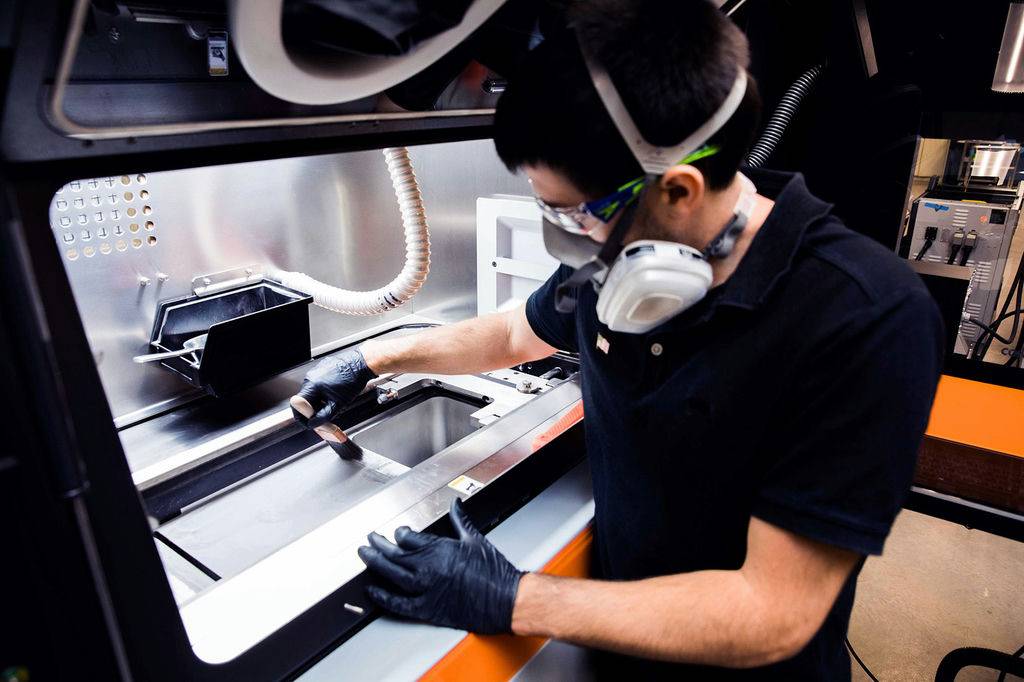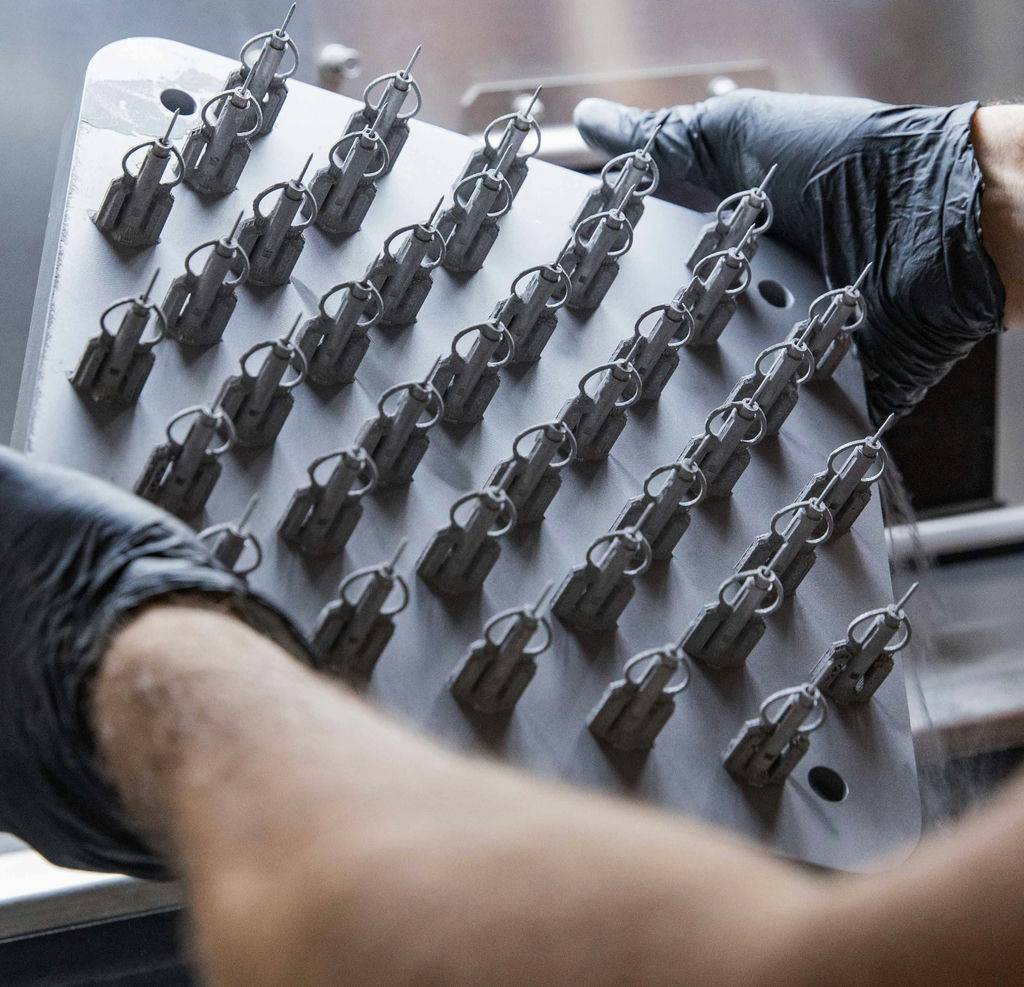- Trust is a key to oil and gas sector use of metal parts made by additive manufacturing, says leading manufacturer Protolabs.
- Protolabs is working with DNV GL to achieve ‘Qualification of Manufacturer’ certification for a Protolabs production facility – the programme includes a ‘build process qualification’ using a particular metal feedstock material
- Protolabs will be among the first manufacturers in the EMEA region to achieve the certification, and will be the first certified manufacturer using powder bed fusion technology in its additive process – ideal for high resolution and geometrical accuracy
- Certification will assure oil and gas industry customers that they can use the additive manufacturing route to unlock efficiency and decarbonization benefits, says Protolabs’ Daniel Cohn
- Cohn explains how the agility of additive manufacturing was proven by its use to make products to fight against COVID-19
As additive manufacturing gains broader acceptance, companies that ‘print’ metal parts and structures to customer specifications are investing in printers that produce increasingly complex and larger products faster and more accurately than before.
Together with the availability of novel feedstock metal powders and metal wires, the latest printers provide customers with a wide range of existing and new materials. These innovations can meet an ever-growing need for sustainability, innovation, and energy-efficient applications by unlocking the cost, efficiency, and decarbonization benefits offered by additive manufacturing. Aerospace and healthcare are among the industries leading the way in ordering high-value, high-performance complex parts made this way.
The oil & gas sector has also started to show interest in using additive manufacturing technology. For example, BP has experimented with 3D printing to create parts for offshore activities1, and Total2 has used ‘printed’ polyamide polymer and titanium parts offshore. However, to unlock the technology’s full potential, the industry as a whole requires assurance that it can trust the products, materials, and the manufacturing and finishing processes involved. Oil and gas players that have trialled additive manufacturing say it is challenging to progress from prototypes to the efficient production of end-use parts that must meet robust performance and safety standards.
Before COVID-19 slowed economies, the global market for metal-based additive manufacturing was growing by around 25% per year, according to Protolabs, a leading digital manufacturer whose services include printing and finishing parts for several industries including automotive, aerospace, and consumer electronics. The company’s 2019 global revenues were USD 458.7 million from its digital manufacturing facilities in the US, across Europe, and in Japan.
“Obviously, the question in the short term is how quickly economies will rebound,” said Daniel Cohn, General Manager & 3DP Lead for Protolabs EMEA. “But beyond economic cycles, the main barrier to additive manufacturing is the mindset of engineers and designers, and education for industrial design in universities. They mostly think and have experience in subtractive manufacturing which starts with a block of metal, for example, then removes material to get to the required shape.”
Assurance through certification and audits of additive manufacturing can comply with the general demands of the oil and gas industry to create trust
Daniel Cohn,
General Manager & 3DP LeadProtolabs EMEA
The relative lack of prior experience with additive manufacturing makes trust a key to winning acceptance for parts made this way, Cohn continued: “Additive manufacturing can grow more quickly in sectors including oil and gas if there is trust in the technology, materials, processes, and in the manufacturing companies themselves. Assurance through certification and audits of additive manufacturing can comply with the general demands of the oil and gas industry to create trust.”
While additive manufacturing has been around many years through small desktop printers in laboratories and artisan workshops, it is still ‘emerging’ in its industrialized 3D-printing form. Relative lack of clear rules to guide design or define quality for this market mean some purchasers seek the cheapest additive manufacturing options and end up with bad quality, Cohn added: “It is important to select an additive manufacturing partner who also has process and quality under control.”
Certifying additive manufacturing for the oil and gas sector
Protolabs EMEA has selected DNV GL to set up a Qualification of Manufacturer certification scheme for a Protolabs production facility. For additive manufacturing with metals, Protolabs uses printer technology called direct metal laser sintering (DMLS) that can address the entire industrial metal market and scale readily to meet market developments.
The certification scheme includes Build Process Qualification for Inconel 718, a metal feedstock material. The makers of Inconel 718 describe it as a high-strength, corrosion-resistant nickel chromium that hardens with age and can be readily fabricated, even into complex parts, and used within extreme cold and hot temperature limits.
Cohn explained: “The oil and gas sector is interested in high-temperature, high-durability, anti-corrosion materials. We naturally see possibilities for Inconel 718 and, in a less extreme temperature range, for Stainless Steel 316L, which we also have. We also think there could be possibilities in oil and gas for additive manufacturing with functional polymers in applications where conditions are not so extreme, and we are also set up for this.”
He expects early uses in the oil and gas industry to include additive manufacturing of spare parts where the original moulding casts no longer exist: “I think the sector will also look more into designs specifically for additive manufacturing solutions to increase efficiency and create more robust designs for parts such as pumps and valves.”

Protolabs’ work on certification with DNV GL began in autumn 2020 and is projected to complete by early in the second quarter of 2021. As a basis for the scheme, Protolabs already had in place a number of certifications, such as ISO 13485 certification for metal additive manufacturing.
“ISO 13485, as a rigorous quality management system that requires us to consistently meet customer and regulatory requirements, mirrors the quality commitment we will have to the oil and gas sector,” Cohn commented. “But it is very important to us that we are going through this process with DNV GL, which is well-known and has a high and positive reputation in the oil and gas industry. Working with DNV GL means the oil and gas industry will know that certification did not come easily, that it will withstand deeper scrutiny, and that we are well prepared to support the industry with our technologies.”
Additive manufacturing for efficiency and decarbonization
With the right certification in place, the potential benefits of additive manufacturing for an oil and gas industry focusing on cost efficiency and decarbonization should almost speak for themselves, Cohn believes. “Additive manufacturing is the key to gaining efficiencies at different levels to positively influence the carbon footprint of our society. It offers potential to design and make entire parts in one process rather than creating elements that then have to be assembled together,” he said.
This can improve the resilience, durability, functionality and compactness of parts, he added: ”If these benefits are combined with world-leading quality and fast lead times, there can be supply-chain and energy-use benefits.”
Building up products layer by layer is far less wasteful of resources than removing material from a large block of metal or plastic. A lot of energy and effort goes into milling away maybe 90% of the block to get the final part.
“Once the trust is in place, I think the benefits could see oil and gas supply chain interest in additive manufacturing grow quite quickly,” said Cohn.

Lessons learned in the fight against COVID-19
As a mark of confidence in the future, Protolabs is continuing to invest to react quickly and scale up if needed to meet demand from industries including oil and gas. It is increasing production capacity and capabilities across Europe, including building a new 5,000 square metre additive manufacturing facility near Munich, Germany, due for completion summer 2021. Its investment in more advanced 3D-printers includes the recent purchase of GE’s Additive Concept Laser X Line 2000R and Concept Laser M2 machines. These allow Protolabs’ customers to order larger and more complex 3D-printed parts.
The company says it can usually deliver ordered parts in 24 to, at most, 48 hours from its major sites across Europe and in the US. The agility of its additive manufacturing capability was illustrated when Protolabs rapidly switched some capacity to making personal protective equipment (PPE) and breathing ventilators in the fight against COVID-19 in 2020. “It was the right thing to do but also created wider awareness of what our industry is capable of,” said Cohn.
This showed that additive manufacturing is mature enough to produce functional end-use parts and can be adapted extremely rapidly to changes in demand and the industrial environment – faster than any other technology, Cohn concluded. “The PPE and ventilators story in the pandemic has also proved that an additive manufacturing provider needs to have its processes under control and be able to constantly and repeatedly deliver high-quality parts in the shortest possible lead time. Certification helps assure customers that they can expect those qualities from a manufacturer.”
Insights By DNV.GL.


